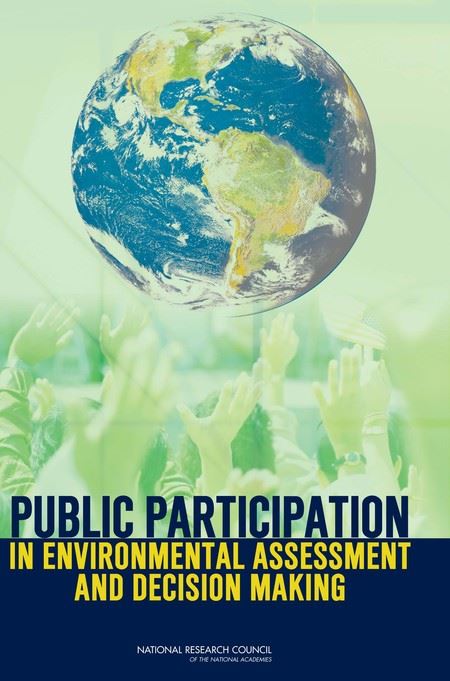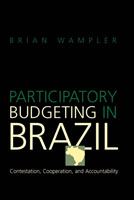Research
IAP2 Research
IAP2 USA is partnering with the IAP2 Canada Research Initiative to build research resources of the organizations.
Conflict Management and Public Participation - This white paper aims to meet the needs of IAP2 members by providing insight into current research in the area of conflict management in public participation. It offers practitioners an overview of a number of new and exciting approaches, and demonstrates how they can be applied to the daily work of IAP2 members to support continued growth and improvement in the industry and more effective public participation. Kate Nelischer, March 2016.
Challenges and Advancements in Evaluating Public Participation - Of the few studies that examine and include evaluation instruments, they rely on a quantitative method using questionnaires with Likert scales to measure indicators that correspond to evaluation criteria; open-ended questions are also included for qualitative feedback. Solutions for practitioners are limited at this time because of minimal advancements in research; however, two promising instruments might aid practitioners in evaluating public participation initiatives. Karen Zypchyn, April 2016.
State of Public Participation Practice in Canada - The State of the Practice Survey was initiated by the IAP2 Canada Great Lakes Chapter in 2012, and its finalization was integrated into the work of the IAP2 Canada Research Subcommittee. It was designed to investigate the practice of public participation (P2) in Canada with the objective of shedding light on the tools, techniques and best practices being employed throughout the country. IAP2 Canada, 2014.
Journal of Public Deliberation (IAP2 Information) In collaboration with the Deliberative Democracy Consortium, IAP2 publishes the Journal of Public Deliberation. This journal is a peer reviewed, open access journal with the principal objective of synthesizing the research, opinion, projects, experiments and experiences of academics and practitioners in the multi-disciplinary field of "deliberative democracy." Journal of Public Deliberation.
U.S. Resources
Websites
U.S. Department of Transportation Public Involvement/Public Participation - Provides links to relevant information and exemplary case studies and examples, US DOT.
Portland-Vancouver Area Online Participation Tool - A community engagement tool open to all residents in the Portland metropolitan area.
Reports
Metro Young Voices, Future Choices - Offers Youth Engagement actions and strategies applicable to any jurisdiction, Oregon Metro, February 2016.
The role of civic knowledge in public education and how school officials can expand it - When district leaders provide civic knowledge through "know how" and "know who," citizens attend, participate, and feel empowered to resume their role as active participants in problem solving and decision making; Poynton, Makela and Haddad, Journal of Civic Literacy, July 2014.
Engaging Historically Under-Represented Communities - Summarizes two discussions among organizational and agency public engagement practitioners who’ve demonstrated success engaging historically under represented communities, Washington County Oregon, April, 2014.
Assessing Public Participation in an Open Government Era A Review of Federal Agency Plans - Details the activities and programs underway in the 29 major agencies and provides case studies of the current and planned participation activities of four agencies: the Department of Transportation, the Environmental Protection Agency, the Department of Health and Human Services, and the National Aeronautics and Space Administration, IBM Center for The Business of Government, 2011.
Hillsboro Water Department ditches 'stuffy, old meetings,' holds a tailgate party instead - Tasked with the job of holding an open house about the city's newest water reservoir, the Hillsboro Water Department headed out to Evergreen Road for a tailgate party, The Oregonian, June 2011.
 Public Participation in Environmental Decision Making - Federal agencies have taken steps to include the public in a wide range of environmental decisions. Although some form of public participation is often required by law, agencies usually have broad discretion about the extent of that involvement. Approaches vary widely, from holding public information-gathering meetings to forming advisory groups to actively including citizens in making and implementing decisions (News Release), National Academies Press, 2008.
Public Participation in Environmental Decision Making - Federal agencies have taken steps to include the public in a wide range of environmental decisions. Although some form of public participation is often required by law, agencies usually have broad discretion about the extent of that involvement. Approaches vary widely, from holding public information-gathering meetings to forming advisory groups to actively including citizens in making and implementing decisions (News Release), National Academies Press, 2008.
Tools & Techniques
Assessing Public Engagement Effectiveness: Rapid Review Worksheets - Developed to help local governments assess how well their public engagement processes worked, Institute for Local Government.
Citizens Juries - The Citizens Jury process is a comprehensive tool that allows decision-makers and the public to hear thoughtful citizen input generated by an informed microcosm of the public, The Jefferson Center.
Software Products Related to Stakeholder Engagement Resources - Compiled by Darzin Software.
World Cafe Method - Drawing on seven integrated design principles, the World Café methodology is a simple, effective, and flexible format for hosting large group dialogue, the World Café.
International Examples of P2
Websites
Institute of Development Studies Participation Team - Presents decades of practice, critical evaluation, and research on participatory methods, particularly in a developing world context, University of Sussex, United Kingdom.
Participation & sustainable development in Europe - An initiative of the German Federal Ministry of Agriculture, Forestry, Environment and Water Management.
Reports
The Edmonton Citizens’ Jury on Internet Voting - The weekend of November 23 to 25, 2012, seventeen Edmonton citizens took part in a Citizens’ Jury, which deliberated on whether to introduce Internet voting as an alternative voting method in future municipal elections, Canadian Parliamentary Review, Summer 2013.
National Standards for Community Engagement, Scotland, 2009.
Breaking Ground: Engaging Communities in Extractive and Infrastructure Projects (Mining) - The World Resources Institute (WRI) analyzed existing community engagement standards and guidance, as well as experiences in several high profile projects. Based on this analysis, WRI developed seven Principles for Effective Community Engagement for extractive and infrastructure projects, World Resources Institute, 2009.
Participatory Budgeting in Brazil - In this first rigorous comparative study of the phenomenon, Brian Wampler draws evidence from eight municipalities in Brazil to show the varying degrees of success and failure Participatory Budgeting has experienced, Penn State University Press, 2007. (Precursor guide published October 2000.)
United Nations Declaration on Community Engagement, Brisbane, Australia, 2005.

